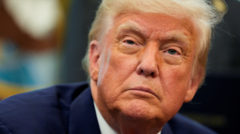With Trump's call for a ceasefire between Pakistan and India, Delhi faces a challenging situation that could force it to reconsider its diplomatic stance on Kashmir and engage in negotiations it has long opposed.**
Trump's Mediation Proposal: A Diplomatic Dilemma for India Amid Kashmir Tensions**

Trump's Mediation Proposal: A Diplomatic Dilemma for India Amid Kashmir Tensions**
US President Trump's recent offer to mediate in the Kashmir dispute between India and Pakistan raises concerns for India’s longstanding position against third-party intervention.**
In a surprising diplomatic twist, US President Donald Trump has stepped into the contentious Kashmir situation, a move that has put India in a precarious position. Over the weekend, Trump announced a "full and immediate ceasefire" between India and Pakistan after a series of intense clashes, suggesting his willingness to facilitate negotiations to resolve the long-standing Kashmir dispute. This offer has stirred a debate in Indian political circles, where third-party mediation has historically been considered a red line.
The Kashmir conflict, ignited in 1947 when British India was partitioned, sees both nations claim the region in its entirety, yet govern only portions of it. Despite numerous bilateral discussions over the decades, no resolution has been achieved, with India declaring Kashmir an irreversible part of its territory and ruling out any negotiations involving external parties. This hardline stance has intensified particularly since 2019 when India revoked the special status of Jammu and Kashmir, leading to significant unrest in the region.
The latest military skirmishes followed India's airstrikes in response to an attack on tourists in Kashmir, leading to increasing tensions that threatened escalation between the nuclear-armed nations. Trump's intervention, while averting immediate conflict, has raised eyebrows in India, where the government's longstanding reluctance to consider outside mediation remains crucial.
Former Indian foreign secretary Shyam Saran highlighted the discomfort with Trump’s proposition, stating that it undermines India's established foreign policy stance. Meanwhile, the opposition Congress party is pressing for clarity on whether India is reconsidering its position on negotiations with Pakistan due to this unexpected development.
In contrast, Pakistan's perspective sees the US's involvement as a significant win, advocating for international mediation in light of historic distrust between the two countries. Pakistani analysts argue that the lack of dialogue demands external support to prevent potential crises from worsening.
India's diplomatic situation is further complicated by its strategic relationship with the US, particularly as it attempts to counter China's growing influence in the region. The complexity of the India-US partnership, marked by significant arms deals and trade discussions, adds an additional layer of pressure on Delhi as it navigates Trump's overtures while seeking to maintain its sovereign stance on Kashmir.
As tensions continue, it is evident that India must tread carefully. The balance it strikes between rejecting third-party involvement and upholding its trade relations with the US could define its foreign policy trajectory moving forward. With Trump’s renewed focus on Kashmir, the prospect of an international dialogue that includes Pakistan could challenge years of unyielding policy, potentially reshaping the geopolitical landscape in South Asia.





















